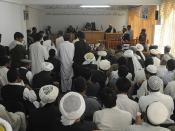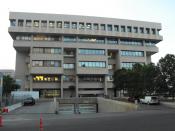The role of a Provincial Court Judge, sitting in the Criminal Division is a somewhat complicated affair. There are many variables deciding where, how, and using which legal principles these cases are heard and tried.
When sitting in a Provincial Court, the presiding Judge is the trier-of-law. There can be no jury present in a Provincial Court, therefore the Judge is also the trier-of-fact. A Provincial Court Judge has exclusive jurisdiction on Summary Conviction Offenses, as well as Class B Indictable Offenses. The Judge can hear Class A Indictable Offenses, but not try them. The Judge, can also try Class C Indictable Offenses, dependant how the accused wishes their case is tried. The role of the Judge is to try all of the cases they have jurisdiction over. But what do all of these terms mean? Let's start at the top. Summary Conviction Offenses are the least serious crimes. The punishments they carry cannot exceed 6 months imprisonment with a $2000 fine.
An example of a Summary Conviction Offense would be Mischief. Someone accused of a Summary Conviction Offense will come to court, and be tried in the Criminal Division of, in this case, the Provincial Court of B.C. They are tried by a Judge, who acts as the trier-of-law, and the trier-of-fact. The Judge must interpret the facts, and decide using the law if the accused committed the crime beyond a reasonable doubt. If so, then the accused is sentenced in accordance with the crime they have committed. What if their crime was more heinous than a petty mischief? Indictable Offenses represent the most reprehensible crimes known to society. They are divided into 3 classes, which are not formal, but give a good idea how everything is organized. Class A includes the most horrible of crimes, such as murder. Class B includes the least serious of this type of offense, like theft under a value of $5000. They are more serious than Summary Conviction Offenses, but are less serious than the rest of the Indictable Offenses. Class C involves the rest of the serious crimes, such as theft over a value of $5000 and grand theft auto. Let's start with Class B Indictable Offenses. Provincial Court Judges have exclusive jurisdiction over these cases like they do Summary Conviction Offenses, and so they are handled in a matter the same as such.
Class C Indictable Offenses are next. They represent most of the serious crimes that are committed. In these cases, a Provincial Court Judge has "consent jurisdiction." This is to say, the accused has to give the Provincial Court Judge consent to try their case. The accused is given an election of up to two choices. Their first election asks them whether they want to have their case tried in the Provincial Court of B.C. or the Supreme Court of B.C. If they do elect to be tried in the Provincial Court, the case is dealt with as if it is a Summary Conviction Offense, although it is NOT one. If the accused chooses to be tried in the Supreme Court of B.C., a Provincial Court Judge will have to give the accused a Preliminary Inquiry as to whether their case has enough merit to be tried by the Supreme Court. This involves using the Balance of Probabilities principle to decide whether a properly instructed jury could convict this man of the crime. The Preliminary Inquiry is used in another type of Indictable Offense⦠The Class A Indictable Offense. The worst of the worst crimes. A Provincial Court Judge has no jurisdiction to try any of these cases, yet they all must go through them. What happens is that there is a Preliminary Inquiry, like with some Class C cases. A Provincial Court Judge decides using the Balance of Probabilities principle whether a properly instructed jury could convict the accused of their crime. If so, they are moved up and tried in the Supreme Court, but if not, then the accused is released.
These are the roles of a Provincial Court Judge sitting in the Criminal Division. They preside over the first step in any crime committed by anyone in the country.





